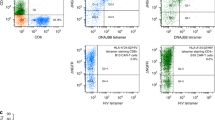Abstract
In recent years, interest in the development of immunologic approaches to malignancies has increased, and there is good evidence that the growth of renal-cell carcinoma (RCC) can be modulated by the host's immune system. Indeed, use of the immunomodulatory cytokine interleukin-2 (IL-2) has been approved for the treatment for this disease. The efficacy of this approach remains low, and there is no other reasonable conventional therapy for patients with metastatic RCC. Therefore, there is a need for the development of novel treatment strategies. The development of autologous tumor-cell vaccines that have been genetically modified to become more immunogenic is an approach that is actively being studied. One of the genetic manipulations that is being employed by several groups is the induction of overexpression of B7-1 to provide costimulation to tumor-reactive T-cells. The rationale for this strategy is that T-cells need two signals before they can mount a cytotoxic response: the binding of the T-cell receptor (TCR) to an antigenic peptide presented on major histocompatibility complex (MHC) molecules and the binding of CD28 to B7-1. Since B7-1 is not normally expressed by RCC cells, the expression forced by transfection of an exogenous B7-1 gene could make the tumor cells more immunogenic. This has been shown to be the case in mice, in which the injection of tumor cells transfected with B7-1 can result in the T-cell-mediated rejection of unmanipulated parental tumor cells. We have applied this approach to the treatment of patients with metastatic RCC. Patients enrolled on our phase I protocol are treated with autologous tumor cells modified to express B7-1, which functions as a tumor vaccine. Primary tumors or metastases are resected from the patients. The tumor cells are adapted to in vitro culture, infected with a recombinant adenoviral vector containing human B7-1 cDNA driven by the cytomegalovirus (CMV) promoter, radiated, and stored in liquid nitrogen. Aliquots of the B7-1 gene-modified tumor cells are given to the patients as a vaccine at varying intervals according to a dose-escalation scheme. The patients also receive systemic IL-2 for the dual purpose of providing accepted therapy for this disease as well as expanding the tumor-reactive T-cells activated by the vaccine. The immunogenicity and toxicity of the vaccine as well as the clinical response are being assessed in three to five patients at each of three dose levels.
Similar content being viewed by others

Author information
Authors and Affiliations
Rights and permissions
About this article
Cite this article
Antonia, S., Seigne, J. B7-1 gene-modified autologous tumor-cell vaccines for renal-cell carcinoma. World J Urol 18, 157–163 (2000). https://doi.org/10.1007/s003450050190
Issue Date:
DOI: https://doi.org/10.1007/s003450050190



